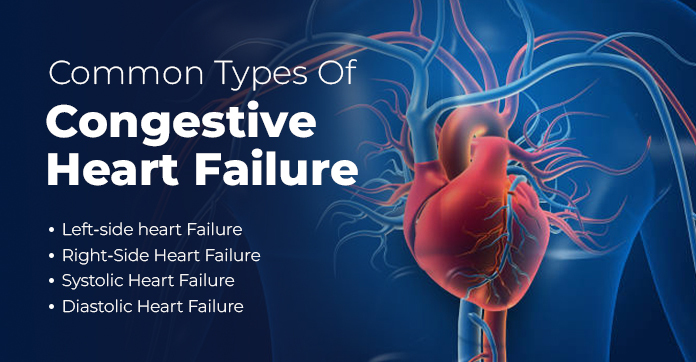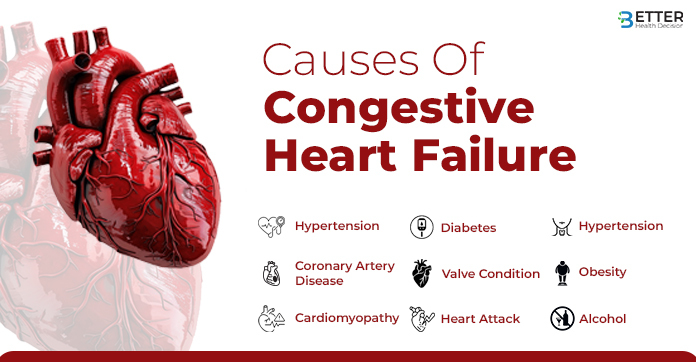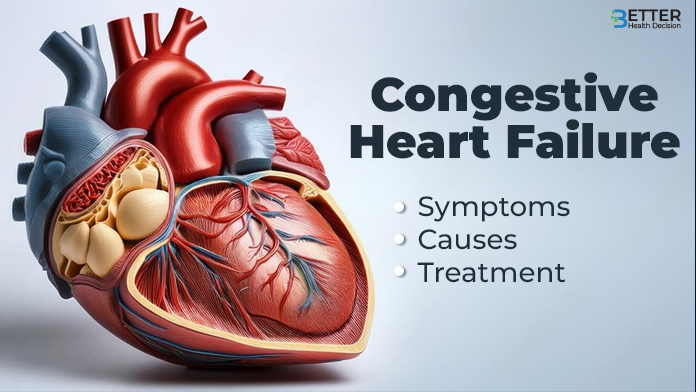Congestive heart failure (CHF) develops when the heart is not able to pump blood adequately to the rest of the body, leading to fluid buildup in the lungs and other organs. It is a chronic disease that can occur from coronary artery disease, hypertension, or because of straining of heart muscles. The symptoms can include:
- Fatigue
- Orthopnea
- Rapid heartbeat
- Breath shortness
- Swelling in legs
Congestive heart failure is of two types:
1- Systolic heart failure
2 – Diastolic heart failure
CHF can be life-threatening, affecting millions of people worldwide, and can significantly impact your daily life. Understanding the causes, symptoms, and treatment options can help manage this condition effectively.
Common Types Of Congestive Heart Failure

Congestive Heart Failure(CHF) can be defined into different types based on which part of the heart is not working correctly and affecting the blood circulation.
1-Left-Side Heart Failure
What Happens?: The left ventricle responsible for pumping oxygen-rich blood to the body becomes weak and fails to function correctly, leading to blood storage at the back of the lungs and other organs, resulting in fluid buildup.
Cause: High blood pressure(hypertension), heart attack, coronary artery disease or valve dysfunction.
Symptoms: Shortness of breath(especially when lying down), persistent coughing or wheezing, extreme fatigue, and fluid retention in the lungs.
2-Right-Side Heart Failure
What Happens?: The right ventricle can not pump blood adequately to the lungs, leading to fluid buildup in the body, especially in the lower extremities.
Cause: Left-side heart failure(as the failing left heart increases pressure on the right heart), lung disease(COPD, pulmonary hypertension), or valve disease.
Symptoms: Rapid weight gain, swelling in the legs, ankles, and abdomen, bloating, and liver congestion lead to digestive issues and discomfort.
3-Systolic Heart Failure
What Happens?: The heart’s ability to contract and pump blood effectively is reduced due to weakened heart muscles, leading to lower ejection fraction(amount of blood pimped out with each heartbeat).
Cause: Heart attack, myocarditis(inflammation of the heart muscle), cardiomyopathy(disease of the heart muscle).
Symptoms: breathlessness, severe fatigue, dizziness, fluid retention, and reduced tolerance for physical activities due to decreased blood supply to the organs.
4-Diastolic Heart Failure
What Happens?: The heart muscle becomes stiff and loses its ability to relax and fill with enough blood between beats despite normal function. This results in inadequate blood flow.
Cause: Chronic high blood pressure, aging, diabetes, obesity, and heart muscle thickening.
Symptoms: Shortness of breath, swelling in the legs and abdomen.persistent fatigue and an increased heart rate as the heart works harder to compensate for reduced filling capacity.
Symptoms Of Congestive Heart Failure
Initially, CHF will not show visible symptoms; slowly and gradually, you will notice specific changes in your health, and if the condition worsens, medical attention is required.
-Mild Symptoms (Early Warning Signs)
- Fatigue
- Swelling in ankles, feet, and legs
- Rapid weight gain
- Frequent urination, especially at night
- Serious symptoms( Progressive Stage)
- Irregular heartbeat
- Persistent cough or wheezing
- Rapid breathing
- Breath shortness
-Severe Symptoms( Advanced Require Immediate Medical Attention)
- Chest pain spreading to the upper body
- Skin appearing blue due to poor oxygen circulation
- Fainting due to reduced blood flow to the brain
- Fluid buildup in the lungs causing chest congestion and difficulty breathing
- Poor oxygen supply to the brain leads to dizziness and confusion.
Stages Of Congestive Heart Failure
Congestive heart failure (CHF) is a progressive condition classified into four stages based on the severity of heart dysfunction and symptoms.
| Stage | Description | Symptoms |
| Stage A | High risk of developing CHF but no particular symptoms during regular activities | No noticeable symptoms |
| Stage B | Abnormalities in valves or chambers affecting heart pumping ability | No visible symptoms, but affecting heart pumping ability |
| Stage C | Structural heart disease with past or current symptoms of CHF | fatigue, breath shortness, fluid retention, swelling in legs |
| Stage D | Symptoms get severe even when you are resting and require advanced treatment. | Severe shortness of breath, fatigue, swelling, difficulty in performing regular activities |
Causes Of Congestive Heart Failure (CHF)

There are many factors responsible for causing Congestive heart failure:
Hypertension: High blood pressure increases the flow of heart rapidly and makes the heart work faster, leading to weakening or stiffening of heart muscles.
Diabetes: high blood sugar levels damage the blood vessels and nerves, increasing the risk of heart failure.
Thyroid Disorder: Thyroid slows the heart rate and causes edema, affecting heart functionality.
Coronary Artery Disease(CAD): Arteries supply blood to the heart’s narrowed or blocked, leading to chest pain and heart attack.
Valve Condition: Damaged heart valves strain the heart, leading to improper working of the heart.
Obesity: It causes high blood pressure and increases heart strain.
Cardiomyopathy: It weakens the heart’s ability to pump blood properly, leading to heart failure.
Heart Attack: damages heart muscle tissue, reducing its ability to pump effectively.
Alcohol: Regular consumption of alcohol can damage your heart, leading to irregular heartbeat or stroke.
How Is Congestive Heart Failure (CHF) Diagnosed?
Congestive Heart Failure can be diagnosed through various methods, including the patient’s medical history, physical examinations, and diagnostics tests.
If you feel any discomfort in your heart, you should consult your doctor after examining your condition; they will refer you to a heart specialist or cardiologist.
The cardiologist will examine you properly with the help of a stethoscope by listening to your heartbeat. If a heartbeat is working correctly, there is no problem, but if the heart rhythm is not synchronized, the doctor will suggest you perform some tests to clarify whether the heart valves, blood vessels, and chambers are in good condition. Some of the tests are:
1- Blood Test
B-type natriuretic Peptide (BNP) or NT-proBNP Test Measures heart-produced proteins that rise with heart stress; high levels indicate CHF severity.
Kidney, Liver, and Electrolyte Tests: Assess organ function, fluid balance, and potential heart performance complications.
2- X-Ray
A chest X-ray examines the heart size and fluid buildup in the lungs and blood vessels. This test provides a quick and painless treatment to assess heart and lung health, guiding further treatment if required.
3- Electrocardiogram
An electrocardiogram (EKG or ECG) records your electrical activity to detect irregular rhythm, heart enlargement, or past heart attack abnormalities that lead to congestive heart failure.
While an ECG alone cannot confirm CHF, it helps identify underlying heart issues, guiding doctors toward further diagnostic tests like echocardiograms or blood tests for a comprehensive evaluation.
4- Echocardiogram
An echocardiogram is a non-invasive ultrasound test that evaluates heart structure and function. It helps diagnose CHF by measuring ejection fraction, assessing valve health, and detecting fluid buildup. This test provides crucial insights into heart pumping efficiency and guides treatment decisions.
5- MRI (Magnetic Resonance Imaging)
MRI (Magnetic Resonance Imaging) takes a picture of a heart in a moving and still condition to create high-resolution images. This helps diagnose CHF by assessing heart structure, muscle damage, scarring, and blood flow.MRI provides precise ejection fraction measurements and helps identify conditions like cardiomyopathy.
6- Cardiac Catheterization
Cardiac Catheterization is used to check coronary artery blockage by assessing heart function and blood flow. The doctor will insert a thin tube into the blood vessel guided to the heart and threaded from the arm to the upper thigh, where contrast dye will be injected for imaging. It helps detect coronary artery disease, valve issues, and heart muscle weakness.
7- Stress Test
A stress test evaluates how the heart functions under physical exertion or medication-induced stress. It helps diagnose CHF by detecting reduced blood flow, abnormal heart rhythms, or exercise intolerance. This test guides treatment by assessing heart efficiency and identifying underlying cardiovascular issues.
How Can You Prevent Congestive Heart Failure?
While some factors are influenced by genetics, lifestyle choices also play a significant role. Taking proactive steps can help lower your risk of heart failure or delay its onset, improving overall heart health and longevity.
-Adopt A Heart-Healthy Diet
Add more fruits and vegetables to your diet and have a balanced meal filled with whole grains, lean proteins, and healthy fats. Reduce salt, sugar, and saturated fats intake and avoid packaged foods to prevent high blood pressure and cholesterol levels.
-Stay Physically Active
Add more physical activities to your routine, and engage in at least 30 minutes of walking or exercise, such as cycling or swimming. Strength training and flexibility also help improve cardiovascular health and endurance.
-Avoid Smoking And Alcohol
Smoking damages blood vessels and increases the risk of heart disease, while excessive alcohol intake can weaken heart muscles. Quitting smoking and consuming alcohol in moderation significantly improves heart function.
-Weight Management
Being overweight affects heart health by putting extra pressure on heart functioning, increasing the risk of heart failure. If you are not healthy or overweight, indulge in more physical activities.
-Keep Blood Sugar In Check
Diabetes is one of the significant risk factors affecting blood vessels and nerves. Keep your blood level in check with regular physical activity and a balanced diet. If you are a diabetic patient, follow your medication correctly.
-Control Blood Pressure & Cholesterol
Regularly monitor and manage hypertension and high cholesterol through a balanced diet, exercise, stress reduction, and prescribed medications when necessary. Keeping levels in check reduces strain on the heart.
Can A Person Recover From Congestive Heart Failure?
About 6.2 million U.S. adults had heart failure between 2013 and 2016. According to the American Heart Association, around 50% of people diagnosed with congestive heart failure (CHF) live beyond five years, while some lower-risk patients diagnosed before age 50 may live up to 20 years. However, age, other conditions, and sex can reduce life expectancy to under three years.
Small lifestyle changes like balanced meals, weight management, physical exercise, and medication like ace inhibitors and beta-blockers can reduce the risk of congestive heart failure. Prognosis varies, but early detection and treatment can improve the outcome.
Signs And Symptoms Of Heart Failure In Babies And Children
The symptoms of heart failure in babies and children are different as compared to adults, depending on the age of the child and the severity of the condition.
Symptoms In Babies(Infants)
- Poor feeding
- Poor breathing
- Excessive sweating
- Blue skin or lips
- Pale skin
Symptoms In Older Children
- Fatigue and weakness
- Breath shortness
- Swelling in legs, ankles, or abdomen
- Dizziness
- Cough or wheezing
When To See A Doctor?
Initially, CHF doesn’t show any signs, but slowly, it starts affecting your regular activities, making you more exhaustive. If any of these symptoms start worsening, immediately seek medical help.
- Chest pain or heart strain
- Not able to breathe
- Fainting or dizziness
- Palpitations
- Sudden swelling in legs, feet, or abdomen
- Forgetting things or confusion
Overview
When the heart cannot pump blood adequately throughout the body, it starts getting stored in other organs, like at the back of the lungs and other organs, leading to congestive heart failure(CHF). This fluid retention in different parts of the body makes a heart work harder, leading to congestive heart failure. However, with medication and a healthy lifestyle, it can be managed. The earlier your condition is diagnosed, the better outlook you will get related to your heart health.
Your prognosis depends on the advancement of the CHF and whether you are having other health problems also, like diabetes or high blood pressure. By recognizing symptoms, causes, and treatment early, you can take steps to improve your heart and overall health. If you or your loved one is at risk of CHF, consult your doctor immediately for further treatment and guidance.
Frequently Asked Questions About CHF
1 – Can Congestive Heart Failure be detected early?
At the start, there are no visible symptoms to identify CHF, but as your heart functionality starts declining, it will affect your daily life. You start feeling more exhausted and short of breath. But there is no reason to worry; it can be detected early through regular medical checkups, especially if you have any other health issues like high blood pressure, a history of heart disease, or if you are diabetic. Medical tests like blood, echocardiograms, and X-rays can help diagnose CHF before severe symptoms develop.
2- Can CHF be detected with the blood count?
CHF can not be diagnosed alone with a routine blood count, but it can help detect anemia or any infection that can worsen heart failure. This can help you to know your heart condition and whether it is working correctly or not.
3- Can a heart recover from Congestive Heart Failure?
CHF is a chronic disease, but with a healthy lifestyle and proper medical treatment, heart functionality can be improved. Other health conditions like diabetes or high blood pressure can hamper the progression rate, but in some cases, it can partially reverse the damage. However, severe cases may require advanced treatment, like a heart transplant.
4 – For how long can a person live with CHF?
On average, around 50-60% of individuals have survived after having congestive heart failure for a decade with proper treatment and a healthy lifestyle. You can enhance your heart’s ability to function correctly with an appropriate diagnosis, increasing your life expectancy.
5 – Can CHF be cured permanently?
Herat failure has no permanent cure; once it occurs, it affects the heart’s ability to function correctly, and with increasing age, heart function starts declining. However, proper treatment will support the heart and help lessen the symptoms increasing your life expectancy.

